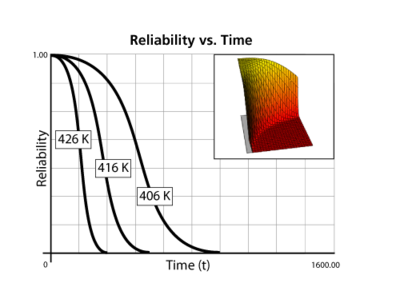Template:Aaw rf: Difference between revisions
Jump to navigation
Jump to search
Chuck Smith (talk | contribs) |
Chris Kahn (talk | contribs) |
||
| Line 9: | Line 9: | ||
If the parameter <math>B</math> is positive, then the reliability increases as stress decreases. | If the parameter <math>B</math> is positive, then the reliability increases as stress decreases. | ||
<br> | <br> | ||
[[Image:ALTA6.7.png|center| | [[Image:ALTA6.7.png|center|400px|Behavior of the reliability function at different stress and constant parameter values.]] | ||
<br> | <br> | ||
Revision as of 15:30, 22 June 2012
Arrhenius-Weibull Reliability Function
The Arrhenius-Weibull reliability function is given by:
- [math]\displaystyle{ R(T,V)={{e}^{-{{\left( \tfrac{T}{C\cdot {{e}^{\tfrac{B}{V}}}} \right)}^{\beta }}}} }[/math]
If the parameter [math]\displaystyle{ B }[/math] is positive, then the reliability increases as stress decreases.
The behavior of the reliability function of the Weibull distribution for different values of [math]\displaystyle{ \beta }[/math] was illustrated here. In the case of the Arrhenius-Weibull model, however, the reliability is a function of stress also. A 3D plot such as the ones shown in the next figure is now needed to illustrate the effects of both the stress and [math]\displaystyle{ \beta . }[/math]
- [math]\displaystyle{ }[/math]

![Reliability function for [math]\displaystyle{ \Beta\lt 1 }[/math], [math]\displaystyle{ \Beta=1 }[/math], and [math]\displaystyle{ \Beta\gt 1 }[/math].](/images/thumb/b/bb/ALTA6.8.png/250px-ALTA6.8.png)